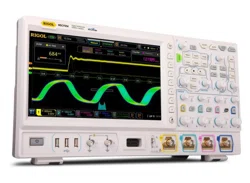Loading ...
Loading ...
Loading ...

Chapter 4 To Set the Sample System RIGOL
MSO7000/DS7000 User's Guide 4-5
Acquisition Mode
The acquisition mode is used to control how to generate waveform points from the
sample points.
MSO7000/DS7000 supports the following three acquisition modes: Normal, Average,
and Peak. By default, the acquisition mode is Normal.
Press Acquire Acquisition on the front panel, and then rotate the multifunction
knob to select the desired acquisition mode. Then, press down the knob to
select the mode. You can also press Acquisition continuously to select the mode or
enable the touch screen to tap the desired mode and select it.
Normal
In this mode, the oscilloscope samples the signal at a specified fixed time interval to
rebuild the waveform. For most of the waveforms, using this mode can produce the
optimal display effects.
Average
In this mode, the oscilloscope averages the waveforms from multiple samples to
reduce the random noise of the input signal and improve the vertical resolution.
Greater number of averages can lower the noise and increase the vertical resolution;
while at the same time, it will slow the response of the displayed waveform to the
waveform changes.
When you select "Average" mode, press Averages and rotate the multifunction
knob
or use the numeric keypad to set the desired number of averages. You can
also use the pop-up numeric keypad to input the average count. When the average
count value is in power-of-2 increments, a prompt message "Trim average count" is
displayed. At this time, a value that is smaller than the one you input and the closest
to power-of-2 increments will be input automatically. For example, if you input 9 with
the numeric keypad, the average count will be input 8 automatically.
The number of averages can be set to 2, 4, 8, 16, 32, 64, 128, 256, 512, 1024, 2048,
4096, 8192, 16384, 32768, or 65536. By default, it is 2.
Loading ...
Loading ...
Loading ...
